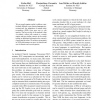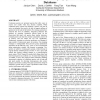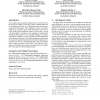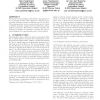135
click to vote
ACL
2011
14 years 5 months ago
2011
We use search engine results to address a particularly difficult cross-domain language processing task, the adaptation of named entity recognition (NER) from news text to web que...
112
click to vote
ERCIMDL
2010
Springer
15 years 3 months ago
2010
Springer
Given a set of keyphrases, we analyze how Web queries with these phrases can be formed that, taken altogether, return a specified number of hits. The use case of this problem is a ...
128
click to vote
SIGMOD
2000
ACM
15 years 6 months ago
2000
ACM
Continuous queries are persistent queries that allow users to receive new results when they become available. While continuous query systems can transform a passive web into an ac...
138
click to vote
CIKM
2005
Springer
15 years 7 months ago
2005
Springer
Search engines process queries conjunctively to restrict the size of the answer set. Further, it is not rare to observe a mismatch between the vocabulary used in the text of Web p...
162
click to vote
SIGIR
2005
ACM
15 years 7 months ago
2005
ACM
Accurate topical categorization of user queries allows for increased effectiveness, efficiency, and revenue potential in general-purpose web search systems. Such categorization be...
141
Voted
PODS
2002
ACM
16 years 2 months ago
2002
ACM
We introduce and investigate a distributed computation model for querying the Web. Web queries are computed by interacting automata running at different nodes in the Web. The auto...
127
click to vote
WWW
2007
ACM
16 years 2 months ago
2007
ACM
Determining the user intent of Web searches is a difficult problem due to the sparse data available concerning the searcher. In this paper, we examine a method to determine the us...




